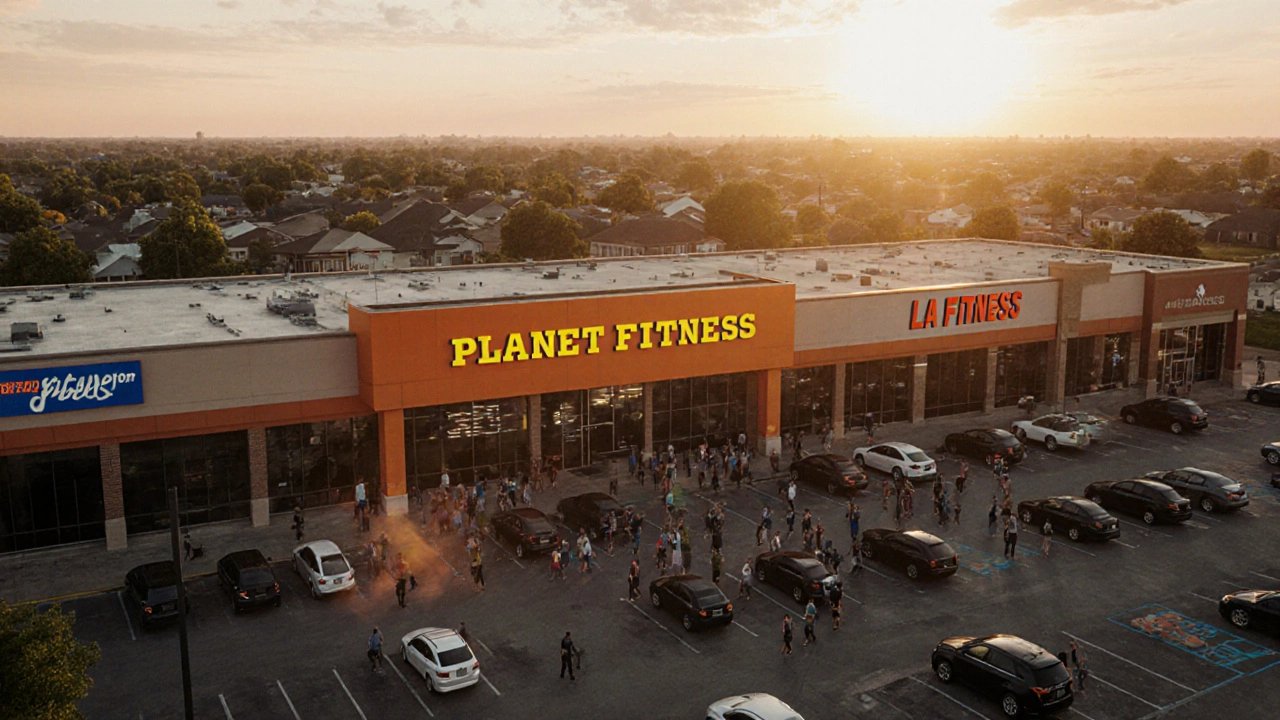Largest Gym Chain in the US - Which Brand Leads the Market?

When you ask largest gym chain US, the answer isn’t just a trivia fact-it tells you where most Americans are getting their workouts, what pricing models dominate, and which brand is shaping the future of fitness.
Understanding the US Gym Landscape
The American fitness industry is a $40+billion market, driven by a mix of traditional gyms, boutique studios, and low‑cost franchises. Membership numbers, real‑estate footprint, and annual revenue are the three metrics analysts use to gauge a chain’s size. Over the past decade, a shift toward affordable, no‑contract memberships has propelled a handful of brands ahead of the curve.
How Size Is Measured
To rank a chain, we look at:
- Location count - the total number of active clubs nationwide.
- Member base - estimated active members, usually disclosed in annual reports or industry surveys.
- Revenue - total sales from memberships, personal training, and ancillary services.
These figures are cross‑checked with data from the International Health, Racquet & Sportsclub Association (IHRSA) and Bloomberg’s market snapshots for 2024‑2025.
Top US Gym Chains Ranked by 2025 Footprint
| Chain | Locations | Members (millions) | 2024 Revenue (BillionUSD) | Avg Monthly Price (USD) |
|---|---|---|---|---|
| Planet Fitness is a low‑cost, nationwide gym chain that focuses on a judgment‑free environment and attracts casual members. | 2,400 | 16.5 | 1.3 | 15‑25 |
| Anytime Fitness is a 24‑hour franchise model that emphasizes convenience and community. | 4,800 | 5.8 | 0.9 | 30‑45 |
| LA Fitness is a mid‑tier chain known for large facilities with pools and group‑class schedules. | 770 | 4.2 | 1.0 | 30‑55 |
| Gold's Gym is a legacy bodybuilding brand that has pivoted toward broader fitness services. | 690 | 2.9 | 0.6 | 35‑60 |
| Crunch Fitness is a high‑energy chain focused on eclectic class formats and flexible pricing. | 380 | 2.1 | 0.4 | 20‑45 |
While Anytime Fitness boasts the most locations, its per‑club member count is lower than Planet Fitness. The metric most people associate with “largest” is total membership, and that crown belongs to Planet Fitness.

Why Planet Fitness Leads in Membership
Planet Fitness’ growth hinges on three pillars:
- Low price point - the "Black Card" tier at $22.99 per month undercuts nearly every competitor.
- Judgment‑Free Zone - branding that welcomes beginners, women, and older adults.
- Real‑estate strategy - leasing large, versatile spaces in suburban strip malls, keeping overhead low.
Because of these strategies, the chain added roughly 300 new clubs in 2024, surpassing the combined net growth of all other top five chains.
Service and Pricing Comparison
Choosing a gym isn’t just about size; it’s about what you actually get for the money. Below is a quick snapshot of core offerings across the major players.
| Feature | Planet Fitness | Anytime Fitness | LA Fitness | Gold's Gym | Crunch Fitness |
|---|---|---|---|---|---|
| 24‑Hour Access | Limited (most locations open 24hrs) | Yes | No (most close 10pm) | No | Yes (selected clubs) |
| Group Classes | None (focus on equipment) | Varies, limited | Wide range, incl. yoga, spin | Standard bodybuilding classes | 30+ unique classes |
| Personal Training | Extra $30‑$40 per session | Included in some memberships | Included or discounted | Premium pricing | Package deals |
| Family Plans | Black Card includes +1 guest | Family bundles available | Family memberships offered | Family discounts limited | Family-friendly options |
For a casual user who wants a gym "just to work out," Planet Fitness still offers the best value. For enthusiasts chasing classes, LA Fitness or Crunch provide richer schedules.

Current Trends Shaping Gym Growth
Three major trends explain why the biggest chains are expanding at different speeds:
- Hybrid Memberships - many brands now bundle virtual classes, and that extra digital layer attracts younger members.
- Corporate Partnerships - companies negotiate bulk memberships for employees, driving bulk sign‑ups for large chains.
- Health‑Insurance Incentives - insurers reimburse members for gym usage, and larger chains can process claims more efficiently.
Planet Fitness has integrated all three, which is why its member count is climbing faster than any rival.
Choosing a Gym Near You
If you’re searching "gym near me," size is only one factor. Ask yourself:
- What’s my budget? If you’re under $30 a month, Planet Fitness or Crunch’s basic plans are ideal.
- Do I need 24‑hour access? Anytime Fitness and select Crunch locations cover that need.
- Am I looking for classes? LA Fitness and Crunch have the most diverse schedules.
- How far am I willing to travel? Larger chains typically have locations within a 10‑mile radius of most suburbs.
Use tools like Google Maps or the chain’s own locator feature to compare distance, price, and amenities side‑by‑side.
Frequently Asked Questions
Which gym chain has the most locations in the United States?
Anytime Fitness leads with roughly 4,800 clubs across the country, making it the chain with the widest geographic footprint.
What gym has the most members?
Planet Fitness tops the list, with an estimated 16.5million active members as of 2025.
Are low‑cost gyms reliable for serious training?
Yes, if you focus on weight‑training and cardio. Chains like Planet Fitness provide quality equipment, but they may lack specialized classes or advanced personal‑training programs.
How do I find the nearest Planet Fitness location?
Visit the official Planet Fitness website and use the "Club Locator" tool. You can also search "Planet Fitness near me" on Google Maps for instant results.
Do gym chains offer discounts for families?
Many do. Planet Fitness includes a guest pass with its Black Card, while LA Fitness and Crunch provide dedicated family membership tiers with reduced per‑person pricing.